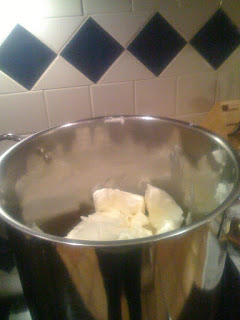Start by gathering equipment.
You'll need
1) A big spoon for stirring. Although it's not required, an immersion blender makes the process go much more quickly. Say, five minutes of stirring versus an eternity.
2) A scale. Most soap recipes measure ingredients by weight rather than volume. I use an inexpensive postal scale.
3) A soap mold. In this case, I used a plastic shoe box. Most recipes suggest oiling the mold with something like mineral oil, or lining it with plastic. I find I don't need to do this with flexible plastic molds.
4) A large non-reactive pot for cooking processing the soap. I use a stainless steel soup pot.
5) A large, heavy glass bowl for mixing lye and water. I make large batches at once so I use an eight cup Pyrex measuring bowl. It's nice that it also has a handle.
6) a wooden spoon for stirring lye and water.
7) a cooking thermometer
8) Safety equipment. This includes safety glasses and heavy gloves. Long sleeves, long pants, and closed shoes wouldn't hurt either.
Always use non-reactive containers and utensils -- that means wood, plastic or stainless steel. And protect counters with thick sheets of newspapers. More importantly, remember you will be working with a strong caustic, so keep children and pets well away. That said, with simple precautions, soap making is easy and pleasant. I've yet to burn myself or anyone else.
The Ingredients
(2) 3 lb cans of vegetable shortening
12 oz lye
24 oz water
essential oil is optional. I added about a half ounce of lavender essential oil.
Steps
1) At medium to low temperature, melt vegetable shortening in large pot on the stove.


No comments:
Post a Comment